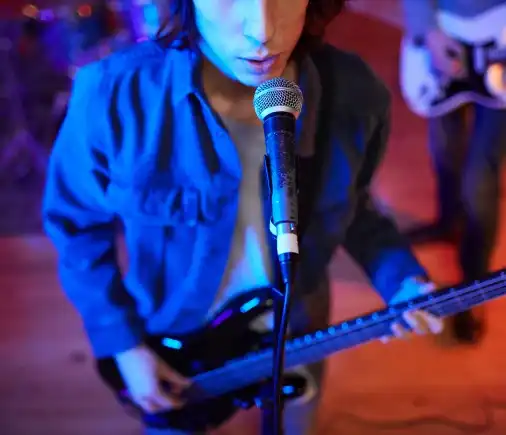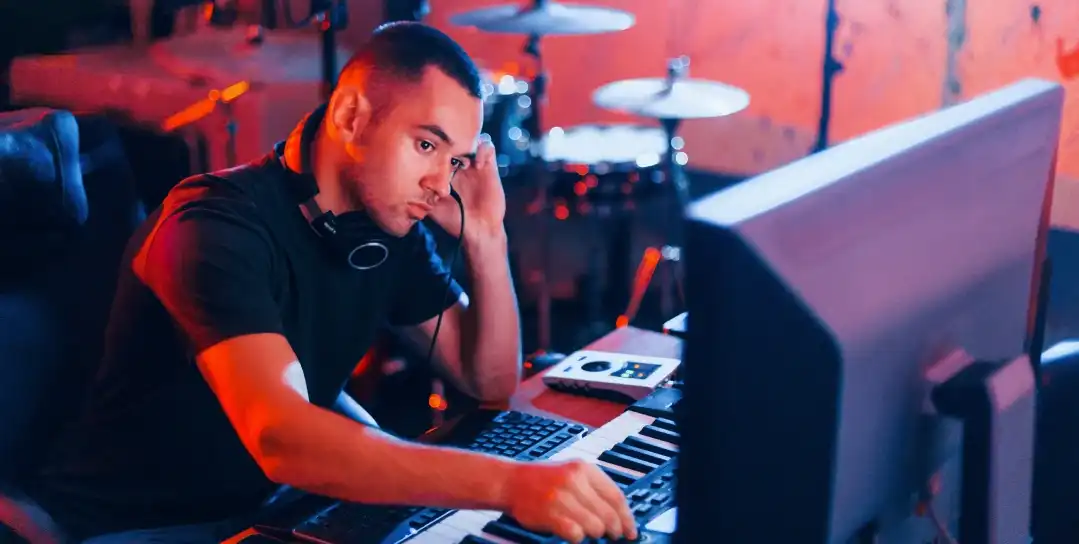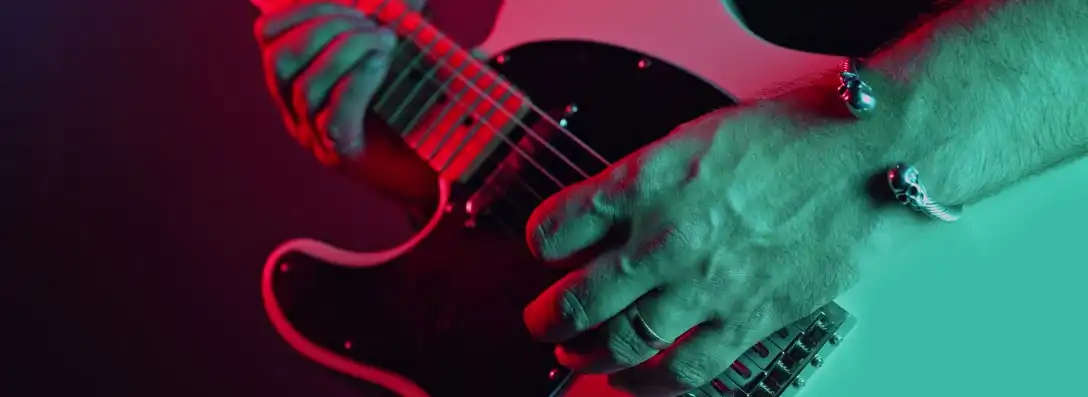6 Key Tips for Emerging Musicians & Artists
Building a successful career within the music industry is easier said than done, especially for emerging musicians and artists. Easily one of the most intricate and complex industries to break into, it’s also an industry that’s in trouble.
Many musicians are not getting fair pay for the work they do. Creativity and inventiveness are not always welcome or encouraged.
Artists do not have access to the essential tools they need to succeed. And with various streaming platforms on the rise, the urge to conform and follow the pack has never been higher.
But music, and the business of making it, has always been a tricky and bewildering practice. It’s true, the music landscape is constantly shifting, as are the different needs and aspirations for most emerging artists. It may be easy to feel unmotivated, frustrated or rejected when your career does not unfold as you had hoped. You’re not alone. The music business is not for the faint of heart, but it remains an essential part of society.
Many musicians are not getting fair pay for the work they do. Creativity and inventiveness are not always welcome or encouraged.
Artists do not have access to the essential tools they need to succeed. And with various streaming platforms on the rise, the urge to conform and follow the pack has never been higher.
But music, and the business of making it, has always been a tricky and bewildering practice. It’s true, the music landscape is constantly shifting, as are the different needs and aspirations for most emerging artists. It may be easy to feel unmotivated, frustrated or rejected when your career does not unfold as you had hoped. You’re not alone. The music business is not for the faint of heart, but it remains an essential part of society.

To help guide you along your way after recording your first EP, I’ve compiled a list of six tips I think every emerging artist should take to heart. By educating yourself about the potential pitfalls that lay ahead, you will be better able to protect yourself and successfully navigate the wild waters of the industry to a haven. I hope these tips will assist you in navigating your way through the minefield of the industry today.
The music business is a cruel and shallow money trench, a long plastic hallway where thieves and pimps run free, and good men die like dogs. There’s also a negative side.-Hunter S. Thompson
TIP 1: Ensure all agreements are clear on paper
This may seem like an obvious tip, but for some, it is not. Imagine you’ve just recorded a song with another songwriter and composer. One of the first things you should do before you take it to any distributor is sign an agreement to clarify who is entitled to what.
It should stipulate who all the creative creators are who worked on the song within that legally binding document. The agreement should outline what percentage of the royalties goes to who and who the publisher is (if any) and the duration of the agreement. This is a way to guarantee that everyone involved with the creation of the song is acknowledged and credited.
Before you sign any agreement or contract, be sure to read everything, including the fine print. Don’t be afraid to ask the other parties involved to explain legal jargon or ask for more time before you sign. With the right legal representation, an agreement should be a document that makes all parties’ responsibilities completely transparent so there is no confusion concerning what is expected.
If you do not fully understand everything in the agreement, what is being asked of you or other obligations, and they do not want to explain them, don’t sign it. As a rule of thumb, it is smart never to sign a contract longer than one year, or covers more than five tracks, unless it’s for a full album.
It should stipulate who all the creative creators are who worked on the song within that legally binding document. The agreement should outline what percentage of the royalties goes to who and who the publisher is (if any) and the duration of the agreement. This is a way to guarantee that everyone involved with the creation of the song is acknowledged and credited.
Before you sign any agreement or contract, be sure to read everything, including the fine print. Don’t be afraid to ask the other parties involved to explain legal jargon or ask for more time before you sign. With the right legal representation, an agreement should be a document that makes all parties’ responsibilities completely transparent so there is no confusion concerning what is expected.
If you do not fully understand everything in the agreement, what is being asked of you or other obligations, and they do not want to explain them, don’t sign it. As a rule of thumb, it is smart never to sign a contract longer than one year, or covers more than five tracks, unless it’s for a full album.

TIP 2: Make sure your work is Registered
Creating and recording an EP or album is a feat in its own right, but before you head off to distribute it, make sure it’s legally registered. It is important that you register your work at a performance rights organisation (PRO), like ASCAP or BMI in the United States or BUMA in the Netherlands.
Once you have recorded a song, you can register who is the song’s creator, but you can also register who the songwriter is, who created the melody, who is the composer, and the artist. You also need to specify if you are working with a record label or publisher with the registration of each song.
Once you have recorded a song, you can register who is the song’s creator, but you can also register who the songwriter is, who created the melody, who is the composer, and the artist. You also need to specify if you are working with a record label or publisher with the registration of each song.
Through this registration, you define the agreement rights for the song and its distribution. After a song is registered, an artist can make external agreements with several third parties to use their work and ensure they receive their due diligence.
For example, imagine a song coming out in one country, Italy, with certain lyrics and a melody in one language. Now imagine another artist in Aruba who wants to create a different version of that song with other lyrics but the same melody. Both artists will need to have a performance license for the song to make it commercial, with the latter paying for the license to use the original song’s melody. The PRO is aware of all agreements concerning the distribution of the song due to the registration.
Not only are you protecting your creative work by registering it at a performance organisation, but it’s also a guarantee to ensure any royalties are paid. Many emerging artists, songwriters, composers and music publishers are unaware that copyright registration protects their creative work and prevents others from monetising it while paying them royalties.
For example, imagine a song coming out in one country, Italy, with certain lyrics and a melody in one language. Now imagine another artist in Aruba who wants to create a different version of that song with other lyrics but the same melody. Both artists will need to have a performance license for the song to make it commercial, with the latter paying for the license to use the original song’s melody. The PRO is aware of all agreements concerning the distribution of the song due to the registration.
Not only are you protecting your creative work by registering it at a performance organisation, but it’s also a guarantee to ensure any royalties are paid. Many emerging artists, songwriters, composers and music publishers are unaware that copyright registration protects their creative work and prevents others from monetising it while paying them royalties.
TIP 3: All about the Metadata
So you’ve registered your song and are ready to start distributing it via different platforms, but did you check your metadata?
The metadata is all the information concerning the recording of your song, including who the singer is, the songwriter, the musicians, and the producer. All this information should be contained in the song’s metadata and submitted to the digital service platform (DSP) prior to uploading.
Popular DSPs include the likes of Apple, Amazon, Spotify and TikTok. This information must be uploaded with the song in one go, along with other facts such as the music’s genre, beats per minute, danceability, etc. This is so playlist editors can see immediately what kind of song it is just by looking at the metadata.
Having the correct metadata linked to each song also ensures creators are paid the right royalties when their music is streamed and shared and helps avoid any potential litigation issues.
The metadata is all the information concerning the recording of your song, including who the singer is, the songwriter, the musicians, and the producer. All this information should be contained in the song’s metadata and submitted to the digital service platform (DSP) prior to uploading.
Popular DSPs include the likes of Apple, Amazon, Spotify and TikTok. This information must be uploaded with the song in one go, along with other facts such as the music’s genre, beats per minute, danceability, etc. This is so playlist editors can see immediately what kind of song it is just by looking at the metadata.
Having the correct metadata linked to each song also ensures creators are paid the right royalties when their music is streamed and shared and helps avoid any potential litigation issues.
TIP 4: Create a promotional plan
Now that you have submitted your song to the DSPs of your choice, you will need to have a solid promotion plan in place to help increase your platform as an artist. A good marketing campaign will help boost the visibility of your work and get more streams.
This should include everything from live performances to having a social media presence and more. When you are still fresh on the music scene, it may feel like you have to hire an entire team to get your track out there. But in reality, it is wise to do whatever you can by yourself. While large labels and production companies have seemingly limitless funds for marketing, social media, and promotional materials, you most likely do not as an emerging artist.
Don’t be afraid to ask for help. Invest your free time in furthering your career and picking up skills to support it. Learn the ins and out of social media marketing, look within your network for talented photographers, make-up artists, wordsmiths and stylists, and create your promotional materials to save on costs.
Having a reliable promotional plan will also help ensure you do not fall into the arms of illegal playlist brokers.
This should include everything from live performances to having a social media presence and more. When you are still fresh on the music scene, it may feel like you have to hire an entire team to get your track out there. But in reality, it is wise to do whatever you can by yourself. While large labels and production companies have seemingly limitless funds for marketing, social media, and promotional materials, you most likely do not as an emerging artist.
Don’t be afraid to ask for help. Invest your free time in furthering your career and picking up skills to support it. Learn the ins and out of social media marketing, look within your network for talented photographers, make-up artists, wordsmiths and stylists, and create your promotional materials to save on costs.
Having a reliable promotional plan will also help ensure you do not fall into the arms of illegal playlist brokers.

TIP 5: Avoid playlist brokers at all costs
Do not be tempted to do business with playlist brokers. It is illegal to pay for a stream, but besides that, the streams you generate are most likely bot streams or fake streams.
Some playlist brokers offer 1,000 streams for as little as 10 euros but do not be tempted by this. Any form of payola, the undercover or indirect payment to a station to play your song or paying for streams is illegal.
Spotify and other DSPs have new algorithms in place that find streams they suspect are from bot farms and flag them and the artist, which can negatively impact your music career and earnings. In the worst scenario, you may even be blacklisted and banned from sharing your music on the platform.
Some playlist brokers offer 1,000 streams for as little as 10 euros but do not be tempted by this. Any form of payola, the undercover or indirect payment to a station to play your song or paying for streams is illegal.
Spotify and other DSPs have new algorithms in place that find streams they suspect are from bot farms and flag them and the artist, which can negatively impact your music career and earnings. In the worst scenario, you may even be blacklisted and banned from sharing your music on the platform.

TIP 6: Keep the broader picture in mind
Remember, at the end of the day, it’s never just about on EP or album. It is about your career as an artist, and that is not built on one track. Have a plan for the future, think about multiple releases, live-performances and see yourself in a wider perspective than just one song. It may be hard not to think that all your success hinges on how one track performs, but just remember the bigger picture. Remember, building a career as an artist is the same as building compound interest. Keep in mind that a singer will spend thousands of hours in the studio creating a two or three-hour concert fans will attend. At the end of the day, it is not about one song or one hit, the more work you put into your music career, the more deposits you put into the bank of your body of work and career. If you really want to crank out that one-hit-wonder, then I advise you to make a Christmas song, so you are guaranteed to get the royalties every year. 😉
By Jonathan Oudekerk